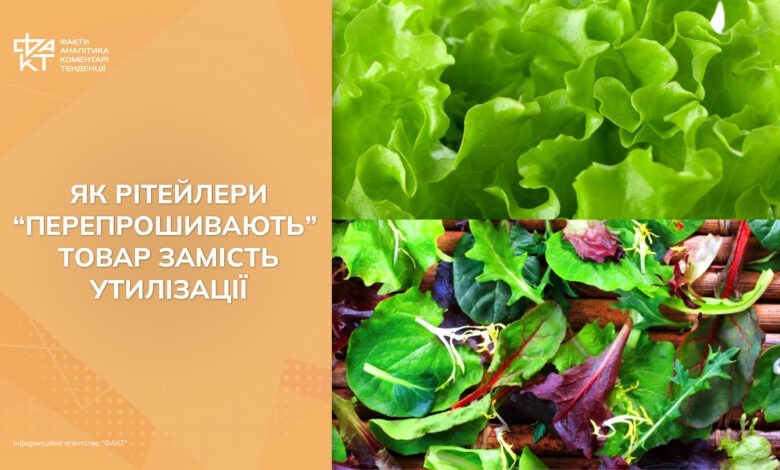Italian greens with Ukrainian sand: how retailers “upcycle” goods instead of disposal

July 2024 was remembered by many for the abnormal heat, hum and stench of generators, with the help of which food retailers tried to save both their goods and their reputation as quality food suppliers. The number of offers on the counters fell to the necessary minimum, and even consumers were in no hurry to stock up, because refrigerators without power were waiting for them at home. The reduction of the product was visible to the naked eye. And it made me think about logistics and food storage. How do retailers manage inventory in such a challenging time, when the heat has combined with energy conservation?
A mixture of “Italian” with Ukrainian admixtures
During the year, I took to the table a mixture of salad leaves under the image name “Italian”. A very convenient set of selected greens that do not need to be washed. You transfer as much as you want to a plate and crunch with young leaves of arugula, spinach, rumex and buls blad.
This time I also bought a familiar mixture from ATB. As usual, she poured it onto the plate, started eating, and suddenly – on her teeth, there was some completely different, not Italian, sand and leaves… After putting the greens on the table, she realized that thrifty sellers had “bewitched” her. A handful of exotics, which probably more or less survived the abnormal heat and improper conditions of transportation, and the rest – roughly chopped leaves of ordinary lettuce, which grandmothers sell in the summer at every turn. As usual, sprinkled with sand and soil from the garden. You can admire the ingenuity of the ATB network, especially when it comes to greenery, which you can’t seem to get poisoned by. And if similar measures are applied to imported products, which nevertheless require special vigilance in terms of quality, condition, and storage conditions? In particular, to meat, fish, cheese products?
The Cabinet of Ministers approved a new list of products that “can’t stand the heat”
It is pleasing that the Cabinet of Ministers listened to the numerous appeals of associations of producers and processors of agricultural products and made changes to the approved list of agricultural products, which have a limited period and a special storage regime. The corresponding resolution was adopted at the regular meeting of the Government. In general, the lists of meat and fish products, by-products, ready-made and canned fish were supplemented, and some fruits, nuts, fruit and vegetable juices were added. It is important that cabbage, kohlrabi, cauliflower, leafy cabbage have been added to the list of agricultural products with a limited shelf life; gherkins, lettuce and chicory. Rapeseed or mustard oil and their fractions, fillets of certain types of fish, frozen meat and others have been added to the list of products that have a special storage regime.
As we can see, the requirements of a limited shelf life have also spread to greens that are apparently safe for health under any conditions.
They could not withstand abnormally high temperatures
In the summer of 2024, Ukraine again faced abnormally high temperatures, especially in July and August. In some regions, temperatures exceeded 38°C for several weeks, causing significant problems with food storage and transportation. In several regions, such as Kyiv, Poltava, and Vinnytsia, cases of spoilage of dairy products due to power outages and malfunctioning refrigeration units were recorded. About 15% of dairy stocks in warehouses and supermarkets were disposed of.
In Odesa and Kherson regions, farmers reported significant losses of vegetable and fruit crops. Due to the high temperature and the lack of proper storage conditions, up to 20% of the harvest of watermelons, tomatoes and apples was wasted.
In large markets in Kyiv and Lviv, losses reached up to 25% of fruits and vegetables due to rapid spoilage of products under the influence of heat.
In the Dnipropetrovsk and Zaporizhzhia regions, cases of disposal of meat products due to malfunction of refrigeration units in stores were recorded. Up to 10% of the stocks of meat and meat products were disposed of.
In coastal regions, such as the Mykolaiv and Kherson regions, high temperatures led to spoilage of the catch. Up to 12% of fish products were disposed of due to the impossibility of ensuring proper storage conditions.
It is impossible to dispose of, “reflash”.
Spoiled agricultural products are subject to disposal, not reformatting, which was proposed in ATB in order to save money on gullible buyers.
Disposal of spoiled food products is an important aspect of waste management in the food industry. In Ukraine, as in many other countries, there are certain methods and rules for the disposal of such products. The main methods include:
- Composting. This is the process of biological decomposition of organic waste, including spoiled food, in the presence of oxygen. The resulting compost can be used as a fertilizer for agricultural crops. This method has been used since ancient times by our grandparents, creating compost pits in their backyards.
- Anaerobic fermentation. This is a process in which organic waste decomposes in the absence of oxygen, producing biogas (a mixture of methane and carbon dioxide), which can be used as an energy resource. After fermentation, a solid fraction remains, which can also be used as fertilizer.
- Combustion Spoiled food can be burned for energy. This method is often used for waste that cannot be processed in other ways.
- Dispatch to landfills. This is the least desirable method from an environmental point of view. Spoiled products that cannot be recycled or used in another way are sent to specially designated landfills.
- Fermentation for animal feed. Some food waste can be used as animal feed after special treatment.
In Ukraine, there are normative acts and rules that regulate the process of disposal of food waste in order to minimize their negative impact on the environment and human health. It’s a shame that not all retailers follow these rules.





